THE CHALLENGE
The impacts of COVID-19 have been felt by all sectors of society. Since Unicon is focused on education, we reviewed a number of surveys given to K-12 and higher education institutions that all provided helpful and informative perspectives from teachers, students, and administrators. One aspect of the crisis’s impact on education that we did not find a lot written about is the plight of the parents or caregivers, who are performing not only their primary function as “parent” but also wearing multiple hats of being home-school teacher, curriculum curator, problem solver - all the while giving their day jobs attention. During the crisis, part of Unicon’s “Take care of each other” philosophy has been extended to caring for employees and members of our extended network in this role. In order to better understand their experiences, we recently surveyed them over a week-long period. The survey generated some interesting results that we will share in the rest of this article.
THE DEMOGRAPHIC
Our survey respondents, 49 in total, had children primarily in K-12, an even distribution between elementary age children and the rest going to middle/high school. The respondents also sent their children to a wide variety of schools, with 64% going to public schools, 18% going to charter schools, and then an even distribution of the rest between private and home schools. Every household had between 1-2 children on an average. We did not include geographic locations of the families in this survey.
SURVEY RESULTS
- Tools, Resources, and Training
Parents indicated that schools provided them with several different tools and resources to equip them with helping their children, so much so, that depending on the school their child was going to, there were too many to navigate! They had everything from Google Classroom and other Google tools, to MS Teams, SeeSaw, Prodigy, ReadWorks, Epic, HappyNumbers, Schoology for LMS, iReady, Rivet, MobyMax, and KhanAcademy, to name a few. Additionally, hardware was distributed in the form of Chromebooks or packets of materials mailed out in cases where there were Internet access issues or younger children not able to use technology effectively.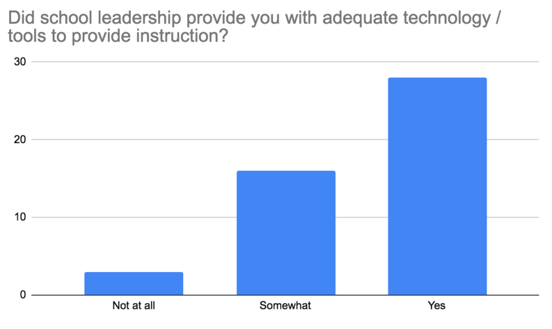
We also asked parents if they were provided with training to use the myriad tools they had to work with. In some cases parents were provided with instructions on how to use the tools, access information and FAQs, however in a lot of cases, there was no guidance given, which left a lot of parents with one more task to add to their list.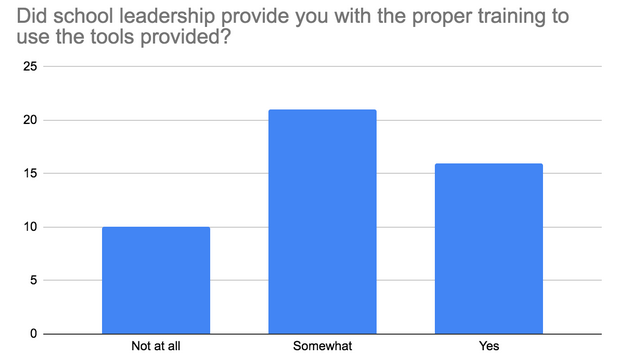
Everyone also indicated that they were using one or more different conferencing solutions: Zoom, Webex, Google Meet, or MS Teams. Every respondent also had access to the hardware required to use the technology and software specified by the school.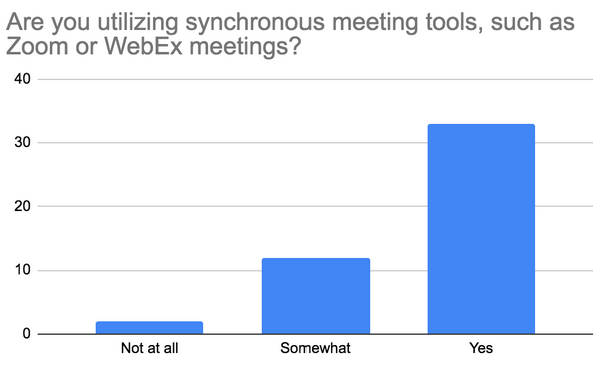
Parents also indicated in the comments following this question that in general, elementary age children participated in these meetings but did not particularly enjoy them. Some were more engaged than others. It was difficult to discern a percentage related to engagement from the data.
- Participation in Discussion Groups, Forums, and Wikis
Participation within the learning environments created by the school was an important aspect of what we wanted to learn about from the parents, so we asked if there was involvement in discussion groups, forums or Wikis created for that purpose. Respondents indicated that there was not, as shown below.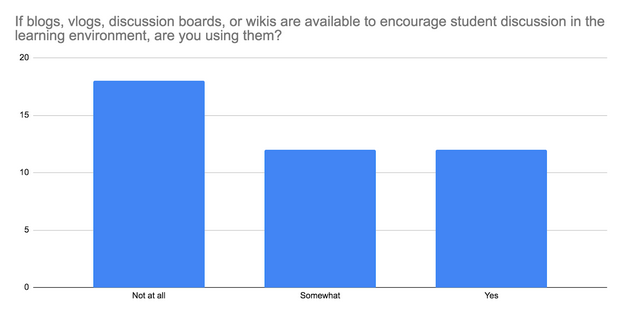
- Testing
We received a wide range of responses when asked about testing expectations at each school. The responses also varied depending on whether it was a traditional public, charter or private school.- There was no testing for children in a homeschool environment.
- Charter schools had timed tests for middle and high school with a Pass/Fail Grade. At the elementary level, all kids were given Pass grades automatically.
- With Traditional Public schools, elementary age kids were all given Pass grades. Middle and high school kids were tested and received a Pass/Fail grade in some instances, and in others were not even required to test or have any accountability to maintain their grades.
- We did not ask whether any high school student was taking AP tests, hence that data is not available.
- Engagement and Special Needs
A small percentage (<10%) of our respondents had children with special needs, hence we also included a question around whether the learning materials provided allowed for children with reading / vision or other challenges to fully participate.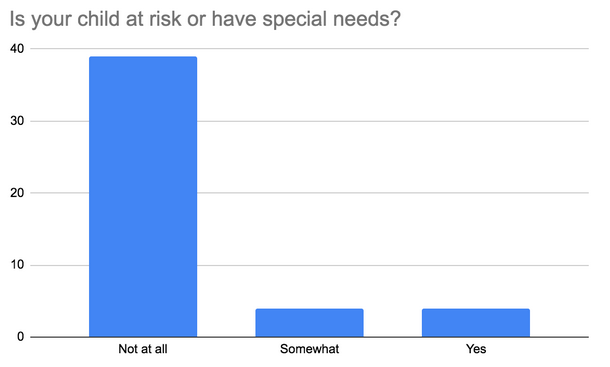
In cases where we had positive responses, the schools provided services like speech therapy using Zoom.
The schools or college board for AP exams did not make special accommodations for AP testing besides giving extended time for completion.
With so many tools, meetings and a different learning environment, we asked if children felt connected and if they had any major difficulties coping. Most parents were on the fence with this one, feeling that sometimes it worked and sometimes it didn’t. Observations from parents were:- Feedback was limited and in some instances not available at all.
- Math instruction completely went away in some cases, as a result, progress in that subject did not happen at the pace it should have.
- Interaction with classmates including Q&A that helps solidify understanding was missing.
- Motivation was an issue--a lot of kids did not feel the need to go online and learn, it was like an extended vacation.
- Children also were shy or had trouble speaking in a web conference type environment, hence did not participate as much as they would have in class.
- The ramp up to this environment was very slow and gradual and both parents and children took a lot of time to get into a routine.
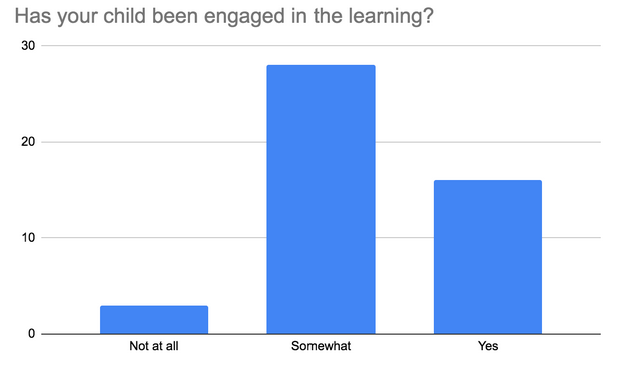
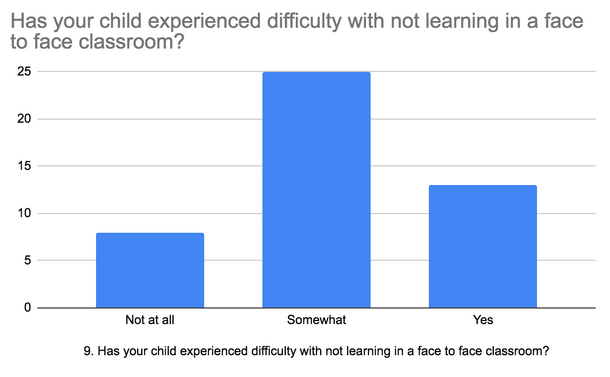
- Emotional Needs
Our biggest observations were related to our questions on the emotional impact of supporting children through this transition, navigating the technology, and providing scheduling and motivation alongside maintaining a full time job. These questions required free form answers and the observations are summarized here:- A big part of children being motivated is their teachers being equipped to teach with the same level of enthusiasm online and providing feedback at regular intervals. Just as they hold each child accountable in the classroom, tools to do that in an online environment would have been very helpful.
- The isolation from peers and friends added to stress in the children affecting moods, behavior and mental state.
- There were great examples of positive reinforcement in an online setting where teachers held Kahoot quizzes based on kid favorite themes like Harry Potter, Greek mythology or Marvel movies.
- StoryTime sessions and read-alouds for all age kids was also a great example of bringing children and parents together.
- Feedback was an integral part of classroom instruction and the lack of timely feedback was felt at all levels - both student and parent, which further created gaps in learning and did not prepare the student for their next logical step.
CONCLUSION
As we highlight the student and teacher experiences encountered by our employees and extended networks in the next set of articles, we wanted to acknowledge the role parents play in the education of the next set of bright minds, their challenges, and their contributions towards navigating this new world of online learning. In addition to providing tools and enabling technologies to further online education, a great deal of thought needs to be given to structuring the learning, providing effective feedback and equipping parents and care-givers with enough support to guide children through it. As education expert and former Arizona governor Jane D. Hull said in a speech given in 2010, “At the end of the day, the most overwhelming key to a child’s success is the positive involvement of parents”.
